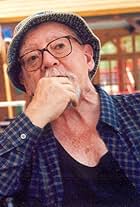Jesús Franco
☼ Born on 12 December 1930, in Madrid, Spain
† Died on 2 December 2013, in Málaga, Málaga, Andalucía, Spain, cause stroke
Biography
He was only six years old when he started composing music under the protection of his brother Enrique. After the Spanish Civil War he was able to continue his studies at the Real Conservatorio de Madrid, where he finished piano and harmony. Being a Bachelor of Law and an easy-read novel writer (under the pseudonym David Khume), he signed on to enter the Instituto de Investigaciones y Experiencias Cinematográicas (IIEC), where he stayed for only two years, while he worked simultaneously as a director and theater actor. Later he went to Paris to study directing techniques at the I.D.H.E.C. (University of Sorbonne), where he used to go into seclusion for hours to watch films at the film archive. Back in Spain he began rted his huge cinematographic work as a composer, with Cómicos (1954) and El hombre que viajaba despacito (1957), and later worked as an assistant director to Juan Antonio Bardem, León Klimovsky, Luis Saslavsky, Julio Bracho, Fernando Soler and Joaquín Luis Romero Marchent, among others. He also worked at Ágata Films S.A. as production manager and writer. His first works as a director were industrial and cultural short films. However, he soon applied all his knowledge and experience to his feature directorial debut, Tenemos 18 años (1959). From that moment on all his work was supported by co-production. His Succubus (1968) was nominated for the Festival of Berlin, and this event gave him an international reputation. His career got more and more consolidated in t
(click to expand)
he following years, and his endless creativity enabled him to tackle films in all genres, from "B" horror films to pure hardcore sex films. His productions have always been low-budget, but he nevertheless managed to work extraordinarily quickly, often releasing several titles at the same time, using the same shots in more than one film. Some of his actors relate how they they were hired for one film and later saw their name in two or more different ones. As the Spanish cinema evolved, Jesús managed to adapt to the new circumstances and always maintained a constant activity, activity that gave a place in his films to a whole filming crew. Apart from his own production company, Manacoa Films, he also worked for companies like Auster Films S.L. (Paul Auster), Cinematográfica Fénix Films (Arturo Marcos), the French Comptoir Français du Film (Robert de Nesle), Eurociné (Daniel Lesoeur and Marius Lesoeur), Elite Films Productions (Erwin C. Dietrich), Spain's Fervi Films (Fernando Vidal Campos) or Golden Films Internacional S.A. He acted in almost all of his films, playing musicians, lawyers, porters and others, all of them sinister, manic and comic characters. Among the aliases he used--apart from Jesús Franco, Jess Franco or Franco Manera--were Jess Frank, Robert Zimmerman, Frank Hollman, Clifford Brown, David Khune, Frarik Hollman, Toni Falt, James P. Johnson, Charlie Christian, David Tough, Cady Coster, Lennie Hayden, Lulú Laverne and Betty Carter. Lina Romay has been almost a constant in his films, and it's very probable that in some of them she has been credited as the director instead of him. In many of the more than 180 films he's directed he has also worked as composer, writer, cinematographer and editor. His influence has been notable all over Europe (he even contacted producer Roger Corman in the US). From his huge body of work we can deduce that Jesús Franco is one of the most restless directors of Spanish cinema. Many of his films have had problems in getting released, and others have been made directly for video. His work is often a do-it-yourself effort. More than once his staunchest supporters have found his "new" films to contain much footage from one or more of his older ones. Jesús Franco is a survivor in a time when most of his colleagues tried to please the government censors. He broke with all that and got the independence he was seeking. He always went upstream in an ephemeral industry that fed opportunists and curbed the activity of many professionals. Jess Franco died in Malaga, Spain, on April 2, 2013, of a stroke.
No post written about Jesús Franco


